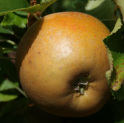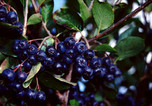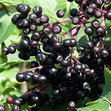Fruits
When our plantings mature, Stone Court Farm will offer a wide selection of unusual, heirloom and native fruits. Extraordinary flavor is our first criterion in choosing new plants to add to our orchard and edible hedgerows. We also seek out varieties that will thrive in our environment without chemical fertilizers or pesticides.
Apples

Tired of store-bought apples that look pretty but taste like watery cellulose? The trees in our orchard were carefully selected for flavor. From the rich, pear-like quality of St. Edmund’s Pippin to the spicy, aromatic flavor of the Snow Apple and the rich, mild, sub-acid flavor of Westfield Seek-no-further, these are your great-grandmother’s apples come back to life.
Our orchard is new, and production of apples for market is still a few years off. Until then, we hope you’ll enjoy fruit from some of our earlier-maturing plants.
Our orchard is new, and production of apples for market is still a few years off. Until then, we hope you’ll enjoy fruit from some of our earlier-maturing plants.
Aronia

We called these “chokeberries” growing up in the East, where they grow wild in wet places and at the edge of forests. The birds ate them, but we never did. And that’s a shame, because it turns out Aronia are even higher in anti-oxidants than blueberries. Sure, they’re tart, but they’re also high in Vitamin C. Use them slightly sweetened as a juice, or add them to muffins. Make sure you check our preserves page for our Aronia jam, juice, and syrup. These berries ripen in late August, but it may be another year or two before we can expect a crop from our young plants.
Black Currants

We grow a variety sometimes called “Clove Currants,” Ribes Americana, which are prairie natives. These purple-black fruits have the strong, fragrant flavor you expect from black currants, with less bitter aftertaste than their European cousins. Also see our preserves page for black currant jelly and a lovely syrup that can be added to seltzer for a refreshing summer drink. Ripen late June and July.
Elderberries

We grow American Elder, Sambucus canadensis, which is slightly sweeter than the European variety. Elderberries are high in Vitamin C and also contain potassium and anthocyanins, those powerful anti-oxidants for which blueberries are getting so much credit these days. You won’t be throwing elderberries on your cereal, though—they’re better cooked in syrups, pies, and jams, or turned into traditional elderberry wine. If you don’t feel prepared to prepare them yourself, we will have plenty of preparations on our preserves page. Ripen in late August.